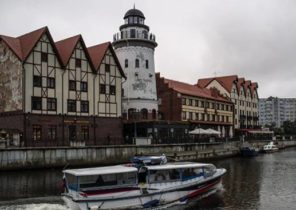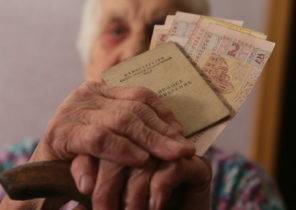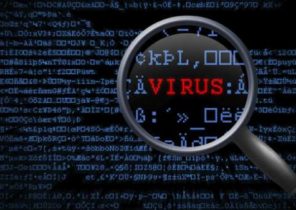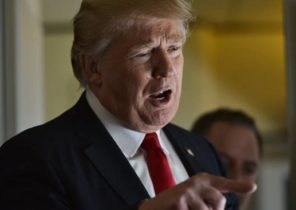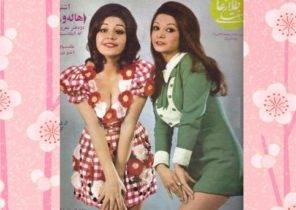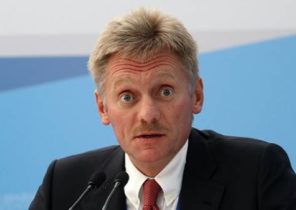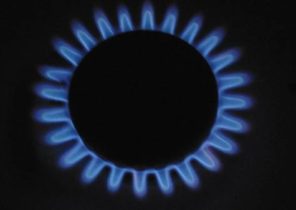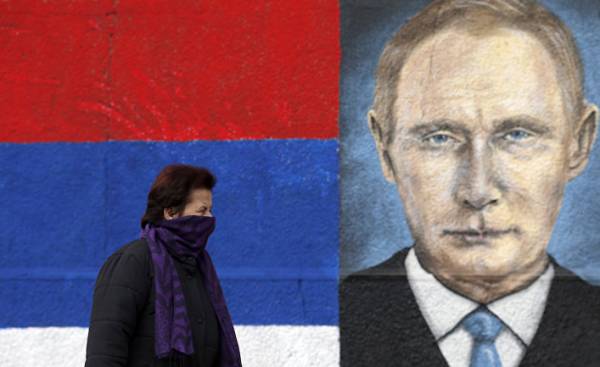
Candidates for the presidency of Serbia want to sit on two chairs at the same time — to join the EU and to flirt with Russia. Until Serbia did not adjust its foreign policy in accordance with the political course of the EU, it will rush between Europe and Russia.
Sunday, April 2, in Serbia held presidential elections. The current President Tomislav Nikolic from the ruling “Serbian progressive party” is not running for a second term. Compete for the presidency of the Republic motley politically candidates. Serbia is a Balkan country with an ambiguous foreign policy, which is like throwing. Since the time of socialist Yugoslavia, Belgrade is trying to position itself as a neutral state in the international arena. At the same time, after the “Bulldozer revolution” and the defeat in the presidential election of 2000, ex-President of the socialist Slobodan Milosevic, the Serbian presidency flirting with Russia and simultaneously demonstrate a desire to join the European Union.
The political mood in Serbian society on the eve of elections varied. According to a native settlement. Krstur (Serbia, Vojvodina region) Samantha rat-Stoiljkovic, who along with his family received political asylum in Ukraine, around 40% of Serbs are interested in the international neutrality of his country and did not accept the NATO bombing in 1999 (the military operation “allied force” to enforce peace the regime of President Slobodan Milosevic in Kosovo). She believes that the Serbs refuse to join NATO, because they do not want to be part of “aggression”. At the same time, she said, about half of the citizens of Serbia share the idea of joining the European Union, following the example of Croatia and Slovenia. In Serbian society there is a Russophile. Samantha rat-Stoiljkovic convinced that about 10% of Serbs are openly supporting the country’s membership in the Eurasian Union. Some policy-Russophile bribing vulnerable people, including pensioners, for the formation of images in the media of mass support for the policies of Russian President Vladimir Putin to Serbia. Sympathy for Russia is based on the historical memory of the Serbs, when in the 19th century during the Russian-Turkish wars in the Balkans Russian Imperial army helped Serbia to get rid of the Ottoman yoke and to increment the new territory.
These sentiments of Serbian society speculating on the eve of the elections, the various presidential candidates who, regardless of political views and hope to attract more voters.
The “progressive” nationalists: for Russia and Europe
Among Serbian voters the authority uses the current Prime Minister and candidate of the “Serbian progressive party” Alexander Vucic. According to an Ipsos survey for former defense Minister ready to vote 53% of the Serbian citizens. Alexander Vucic has positioned itself as a “strong leader”, a politician of the new formation, which intends to deepen the integration of Serbia into the EU. Aleksandar Vucic excludes recognition of Kosovo as an independent state from Serbia. The candidate enjoys the confidence of the Kosovo Serbs who still live in the North of the breakaway region. This Wednesday to participate in rallies in support of Aleksandar Vucic in Serbia tried to check out 3 thousand local Serbs. Local Albanian movement self-Determination was blocked by logs and stones the way for their buses.
The ruling “Serbian progressive party” is trying to put Aleksandar Vucic as more Pro-European candidate in the eyes of Europe. The party refused to nominate the incumbent President Tomislav Nikolic as its candidate. The party dominates the national Assembly (Serbian Parliament) and interested in the fact that the EU has not relied on members of the opposition. Tomislav Nikolic is a controversial personality in the eyes of Europe. He refused to join anti-Russian sanctions. Nikolic is convinced that the well-being of Serbia depends on relations with Russia, and until recently supported the implementation of the Russian project of gas pipeline “South stream”. According to the EU Commissioner for neighbourhood policy and enlargement Johannes Hahn, Serbia demonstrates its unwillingness to converge with the EU in foreign policy, refusing to support anti-Russian sanctions. Johannes Hahn is concerned about the strengthening of the Serbian nationalists on the eve of the presidential election. Tomislav Nikolic, until 2008, was a member of the ultra-nationalist “Serbian radical party” Vojislav Seselj. Vojislav šešelj with 2003-14 he was in prison in the Hague on charges of sponsoring the Serbian insurgents (nationalists “Chetniks”) and inciting ethnic hatred during the Yugoslav wars in the early 90s. Perhaps Tomislav Nikolic closed his eyes to prepare a group of Serbian ultranationalist coup in the neighboring Montenegro last year.
Aleksandar vučić intends to sit on two chairs and is not going to break off relations with Russia. Overall it suits the Kremlin. On Monday Vladimir Putin discussed with Survived the political situation in the Balkans and wished “the current government” success in the elections. In 2010, “Serbian progressive party” and the party “United Russia” signed a cooperation agreement, under which Moscow and Belgrade consult and exchange information on various issues. Russia and Serbia are developing close relations in the field of business. Russia supplies to Serbia hydrocarbon resources, engineering, chemical products, and buys food, some types of industrial products. In 2016 the bilateral trade volume amounted to 1.6 billion dollars. Russian investments in the Serbian economy amount to $ 3.9 billion. Russia sees Serbia as a possible route for the onshore sections of the gas pipeline “Turkish stream”. The main shareholder of the Serbian oil-refining company “Oil industry of Serbia” is the Russian company “Gazprom Neft”. “Russian Railways” engaged in the modernization of the railway industry of Serbia.
However, Aleksandar Vucic, have their own skeletons in the closet. For 14 years he was on the post of Secretary General of the “Serbian radical party”. The plume stretches of radical nationalism and the Serbian Prime Minister. According to the editor of the information resource EUROPP Tena Prelec, Vucic mainly support the rural population. More critical to his person are in the capital and major cities. The image Vucic may be adversely affected by last year’s scandals involving the unauthorized demolition of buildings in the city center and around it of the same party, the mayor of Belgrade Sinisa Mali, “the Serb progressive party,” whose ex-wife was accused of corruption.
On the eve of presidential elections in Serbia seven main Newspapers of the country came with the same first bands to support Vucic. On the front page of a red-blue logo Vucic without any headlines or news. Former Serbian President Boris Tadic said that “print media showed the real state of democracy according to the rules Vucic”. He even compared Vucic with the North Korean rulers.
Far-right eurosceptics against NATO in favor of the Kremlin
Influential candidate is the leader of the “Serbian radical party”, the ultranationalist Vojislav Seselj, who was supported by 8.7% of the population of Serbia. It occupies the third position in number of supporters in the Serbian society. Vojislav šešelj opposes Serbia’s accession to the EU and NATO, supports closer ties with Russia. “Serbian radical party” supports the idea of a “greater Serbia” wants in a political way to regain control of Belgrade over Kosovo, Montenegro, Serbian parts of Bosnia and Herzegovina, Croatia and Macedonia. According to the Serbian scientist Ventsislava Bujica, Deputy Prime Minister Dmitry Rogozin during a visit to Serbia met with Seselj at the beginning of 2016 and discussed with him the possibility of involving into the sphere of influence of the Kremlin Montenegro and Macedonia. Seselj acts as a conduit for Russian interference in the internal Affairs of the Balkan States. He visited the annexed Crimea in the composition of the Serbian delegation and considers that the Peninsula “was taken from Russia by the Communist regime”, despite the fact that all decisions in the USSR and in the present Russian Federation, accepted in the Kremlin. The politician is convinced that without a strong and powerful Russia, not the existence of Serbia.
In the Crimea visited another radical presidential candidate from the party of Euro-skeptics and anti-globalists “Door srpski” (“Serbian dveri”) Bosko Obradovic. According to preliminary data, would vote for him about 3.5% of voters. As Vojislav Vucic, he shares the idea of “greater Serbia”, believes that the need to integrate the Serbian land. Party “Doors srpski” organize a rally in Belgrade against cooperation with NATO. Bosko Obradovic is in deep opposition to the current government and believes that Russia should not trust her. He opposes anti-Russian sanctions.
Serbian far-right reflect in their rhetoric sentiment of that part of Serbian society, which believes that all Serbs should live in one state (Serbian irredentism). “Collectors” Serbian lands believe that Belgrade must dominate the other Balkan Slavs. Like the Russian chauvinists, Serbian ultranationalists are the complexes of “great power” and “victims”. They are convinced that the security of Serbia is threatened by the surrounding countries-members of NATO. They demonize US. Any country that develops the course of European and Euro-Atlantic integration, is perceived by Serbian ultra-nationalists as a military and political opponent. Serbian fighters help Russian Federation to Annex Crimea, and also involved in the conflict in the Donbass on the side of the separatists.
In the case of the coming to power of the ultranationalist Serbia could join the Eurasian Union and the CSTO and become military-political ally of Russia. However, the country is not landlocked and geographically surrounded by countries-members of NATO. Not the best place for military-political bridgehead in Russia. Not worth the ultra-right to hope for the realization of the idea of “greater Serbia”. The West has the resource to further destabilize public-political situation in Serbia to put pressure on the government of the country and correct their political course in a predictable direction. Centrifugal tendencies exist in the region of Vojvodina, where the Hungarian minority in southern Serbia, where there are Albanians. From the antagonism with the West may suffer ordinary Serbian citizens, as it was in the 90s.
Serbian Democrats: ours and yours
Among the presidential candidates featured several candidates who were in the civil service in the period of power of the “Democratic party” and “Democratic party of Serbia”. Among them are independent candidates — former Ombudsman Alexander Jankovic, whom are ready to vote 10% Serbs (in the second position after Aleksandar Vucic), former Minister of foreign Affairs of Serbia Vuk jeremić (6.9 per cent) the candidate from “Democratic party of Serbia” and former Minister of Geology of the Alexander Popovich (1.1 percent). In their foreign policy priorities of these candidates are not much different from Vucic — emphasis on the development of EU integration, combined with close relations with Russia and China. In elections will participate the leader of the “League of social Democrats of Vojvodina” Nenad Chanak. He favored the federalization of Serbia, and his party participated in the ruling coalition of Prime Minister Mirko Cvetanović (was in power in the years 2008-12). However, democratic candidates are weak.
For the West the best victory of one of candidates-Democrats in the elections in Serbia. During the presidency of Boris Tadic in Serbia 2004-2012 intensified processes of European integration. In 2007 was signed the agreement on stabilization and Association of Serbia and the EU. In 2009, Serbia applied for EU membership. The European Union abolished visas for Serbian citizens. Democrats for the establishment of relations with the West gave to the Hague Tribunal, the leaders of the separatists and Serbian war criminals Radovan Karadzic, Ratko Mladic, Goran Hadzic. The Serbian Democrats have proved to be more soft and compliant policy. President Boris Tadic did not prevent the holding of a referendum on Montenegro’s independence in 2006, in which the Balkans a new state, but Serbia lost access to the Adriatic sea.
Serbian Democrats are sensitive to the issue of Serbia’s territorial integrity and refuse to recognize Kosovo’s independence. Presidential candidate Vuk jeremić uses the theme of the return of Kosovo during his election campaign. Ukraine and Serbia have a similar problem with territorial integrity might follow the policy of mutual non-recognition of Kosovo’s independence and the annexation of the Crimea. Ukrainian and Serbian businesses develop close cooperation in the field of metallurgy, engineering and construction, because the deterioration of relations in the political sphere is undesirable for both countries.
The candidates-Democrats have weaknesses. They are significantly inferior to the ratings Uucico. During the reign of the Democrats was accompanied by unpopular measures among the population of Serbia. The secession of Montenegro supported not all Serbs. Tadic to attract European investments has sold a number of Serbian companies to the Italian business. The EU is the main trading partner of Serbia. According to the European Commission, in 2016 the volume of bilateral trade between Serbia and the member countries of the EU amounted to 20.4 billion Euro (72% of trade with the rest of the world). According to Samantha rat-Stoiljkovic, because of the policies of Italian employers, many Serbs were left without work. In her village Ruski Krstur (Vojvodina) in food ABC FOOD company number of employees was reduced to 50 people. People delayed wages for 5 months. By 2014, unemployment in Serbia reached 21.5 percent (currently about 13%).
Not worth Serbian politicians hope for support from the EU. Whoever was in power in Belgrade, while Serbia did not adjust its foreign policy in accordance with the political course of the EU, it will not be able to move forward on the issue of European integration. This means that the EU expects from Serbia’s recognition of Kosovo’s independence, as did the leading countries of the West, and accession to the policy of sanctions against Russia. A more acceptable alternative than the EU for Serbia at the moment, not from an economic point of view.
